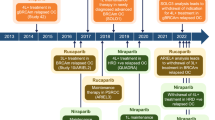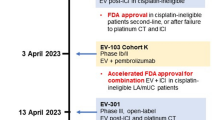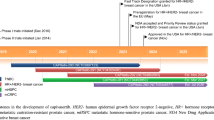Summary
Purpose: Enzastaurin is an oral serine/threonine kinase inhibitor of the beta isoform of protein kinase C that may have therapeutic activity in prostate cancer. We explored the efficacy of enzastaurin on two cohorts of patients with prostate cancer progression in the castrate state. Patients and Methods: A two-cohort phase II trial was conducted, with both groups participating simultaneously. Cohort 1 consisted of patients with non-metastatic castrate prostate-specific antigen progressive disease. Cohort 2 consisted of patients with castrate metastatic disease with progression following docetaxel-based chemotherapy. Patients in both cohorts received 500 mg/day enzastaurin. Results: Therapy was well tolerated in both cohorts. One complete response was observed in Cohort 1, with limited activity in the majority of patients. In Cohort 2, no objective responses were seen and the median progression-free survival (11 weeks [90% confidence interval: 7.6, 11.7]) did not differ from the historical control. Conclusions: Enzastaurin as a single agent has limited activity in castrate progressive prostate cancer. Evaluation in combination with docetaxel is ongoing.

Similar content being viewed by others
References
Jemal A, Siegel R, Ward E, Hao Y, Xu J, Thun M (2009) Cancer Statistics, 2009. CA Cancer J Clin 59:225–249
D’Amico A, Whittington R, Malkowicz S et al (2002) Biochemical outcome after radical prostatectomy or external beam radiation therapy for patients with clinically localized prostate carcinoma in the prostate specific antigen era. Cancer 95:281–286
Moul J, Wu H, Sun L et al (2002) Epidemiology of radical prostatectomy for localized prostate cancer in the era of prostate-specific antigen: an overview of the Department of Defense Center for Prostate Disease Research national database. Surgery 132:213–219
Cooperberg MR, Grossfeld GD, Lubeck DP, Carroll PR (2003) National practice patterns and time trends in androgen ablation for localized prostate cancer. JNCI Cancer Spectrum 95:981–989
Small EJ, Ryan C (2006) The case for secondary hormonal therapies in the chemotherapy age. J Urol 176:S66–S71
Tannock I, de Wit R, Berry W et al (2004) Docetaxel plus prednisone or mitoxantrone plus prednisone for advanced prostate cancer. N Engl J Med 351:1502–1512
Pienta K, Bradley D (2006) Mechanisms underlying the development of androgen-independent prostate cancer. Clin Cancer Res 12:1665–1671
Knudsen K, Scher H (2009) Starving the addiction: new opportunities for durable suppression of AR signaling in prostate cancer. Clin Cancer Res 15:4792–4798
Gescher A (2000) Staurosporine analogues—pharmacological toys or useful antitumour agents? Crit Rev Oncol Hematol 34:127–135
Jarvis W, Grant S (1999) Protein kinase C targeting in antineoplastic treatment strategies. Invest New Drugs 17:227–240
Parker P, Murray-Rust J (2004) PKC at a glance. J Cell Sci 117:131–132
Graff J, McNulty A, Hanna K et al (2005) The protein kinase Cbeta-selective inhibitor, Enzastaurin (LY317615.HCl), suppresses signaling through the AKT pathway, induces apoptosis, and suppresses growth of human colon cancer and glioblastoma xenografts. Cancer Res 65:7462–7469
Koren R, Ben Meir D, Langzam L et al (2004) Expression of protein kinase C isoenzymes in benign hyperplasia and carcinoma of prostate. Oncol Rep 11:321–326
Robertson M, Kahl B, Vose J et al (2007) Phase II study of enzastaurin, a protein kinase C beta inhibitor, in patients with relapsed or refractory diffuse large B-cell lymphoma. J Clin Oncol 25:1741–1746
Carducci M, Musib L, Kies M et al (2006) Phase I dose escalation and pharmacokinetic study of enzastaurin, an oral protein kinase C beta inhibitor, in patients with advanced cancer. J Clin Oncol 24:4092–4099
Petrylak DP, Sartor O, Witjes F et al (2007) A phase III, randomized, double-blind trial of satraplatin and prednisone vs placebo and prednisone for patients with hormone refractory prostate cancer (HRPC). 2007 Prostate Cancer Symposium, Orlando Florida. Abstract 145
Sternberg C, Petrylak D, Sartor O et al (2009) Multinational, double-blind, phase III study of prednisone and either satraplatin or placebo in patients with castrate-refractory prostate cancer progressing after prior chemotherapy: the SPARC trial. J Clin Oncol 27:5431–5438
Simon R (1989) Optimal two-stage designs for phase II clinical trials. Control Clin Trials 10:1–10
Garhyan P, Baldwin J, Welch P, Thornton D (2009) Population pharmacokinetic modeling of enzastaurin and its major metabolite in healthy subjects and cancer patients. American Conference on Pharmacometrics 2009. http://www.go-acop.org/acop2009/posters. Accessed 07 Feb 2010
Lawless JF (1982) Statistical models and methods for lifetime data (Wiley Series in Probability & Mathematical Statistics). Wiley, New York
Collett D (2003) Modelling survival data in medical research. Chapman & Hall/CRC, Boca Raton
Kaplan EL, Meier P (1958) Nonparametric estimation from incomplete observations. J Am Stat Assoc 53:457–481
Smith MR, Kabbinavar F, Saad F et al (2005) Natural history of rising serum prostate-specific antigen in men with castrate nonmetastatic prostate cancer. J Clin Oncol 23:2918–2925
Dreicer R (2008) Current status of cytotoxic chemotherapy in patients with metastatic prostate cancer. Urol Oncol 26:426–429
Podar K, Raab M, Chauhan D, Anderson K (2007) The therapeutic role of targeting protein kinase C in solid and hematologic malignancies. Expert Opin Invest Drug 16:1693–1707
Deacon E, Pongracz J, Griffiths G, Lord J (1997) Isoenzymes of protein kinase C: differential involvement in apoptosis and pathogenesis. Mol Pathol 50:124–131
Ali A, Ali S, El-Rayes B, Philip P, Sarkar F (2009) Exploitation of protein kinase C: a useful target for cancer therapy. Cancer Treat Rev 35:1–8
Acknowledgements
The authors thank all of the patients and institutions involved in this study and Eli Lilly and Company for its sponsorship and funding. The authors also thank Mary Dugan Wood who provided medical writing services on behalf of Eli Lilly and Company, Joseph Durrant (i3 Statprobe,Ann Arbor, MI) for editorial assistance, and Flora Ayeni for assistance with the statistical analyses.
Author information
Authors and Affiliations
Corresponding author
Additional information
Trial registry: ClinicalTrials.gov.Registry identifier number: NCT00428714.
Rights and permissions
About this article
Cite this article
Dreicer, R., Garcia, J., Hussain, M. et al. Oral enzastaurin in prostate cancer: A two-cohort phase II trial in patients with PSA progression in the non-metastatic castrate state and following docetaxel-based chemotherapy for castrate metastatic disease. Invest New Drugs 29, 1441–1448 (2011). https://doi.org/10.1007/s10637-010-9428-0
Received:
Accepted:
Published:
Issue Date:
DOI: https://doi.org/10.1007/s10637-010-9428-0




